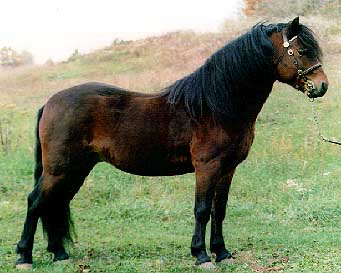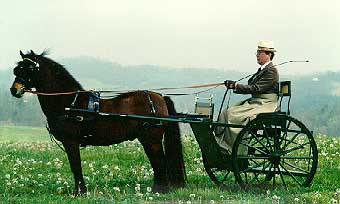

Dartmoor


Introduction: If you have any comments or suggestions, please click here.
Names: Dartmoor, Dartmoor Pony.
Origin: England, Dartmoor region; usually reared in semi-wild state. But there are many private studs, where the best ponies are found. (Dartmoor Pony Society) This wild pony comes from the moors of Devon and Somerset. A half-wild breed of pony, living on the rugged plains of Dartmoor in the extreme southwest of England. In some quarters, unfortunately, cross-breeding with Shetlands has served to obliterate the purebred Dartmoor pony.
Breeding: Lives half-wild on Dartmoor in southwest England. Shetlands, introduced to reduce the size when Dartmoors were popular as pit-ponies, made most of the moorland herds crossbred, but studs throughout the country breed them pure. Old native breed of pony; crossed with Thoroughbred produces a useful hunter.
Description: One source says they resemble the Welsh pony (probably meaning the Welsh Mountain), with strong signs of an ancient mingling with desert stock. The Dartmoor is a stockier horse than the Exmoor. General impression is of a useful, well-made pony.
Action: Stride is reaching, without the showy elevation of the Welsh. Excellent walk; great galloping and above-average jumping abilities.
Body: Elegant with sturdy conformation. Well-proportioned neck, and oblique, good shoulders. Powerful back with strong loins. Quarters somewhat short with well-carried tail.
Color: Colors include brown, bay, black, gray, and chestnut; any color permitted except piebald or skewbald--purebreds are never spotted. Colour mostly bay, brown or black.
Head: Small and pretty, but somewhat square around jowl and jaw. Small ears.
Hooves: Steel-hard.
Legs: Often rather short in cannons in forelegs and occasionally cow-hocked.
Size: Small, about 12 hands. Up to 12.2 hands. 12 to 12.2 hands. 45-51 inches.
Temperament: Intelligent, with a kind, stout-hearted character that endears it to child riders.
Features: Hardy and surefooted. Rugged and spirited. Quite elegant, fast, hardy pony running out on the moors, with plenty of stamina. Favourite pony for children, with good jumping ability.
Uses: Excellent children's riding pony. They are daring little jumpers and when crossed with full-size horses produce good hunters. On coming in from the wild, however, they are quite rough and need firm training. Essentially a riding pony.
Accomplishments:
Curiosities:
Profiles:
Conclusion: